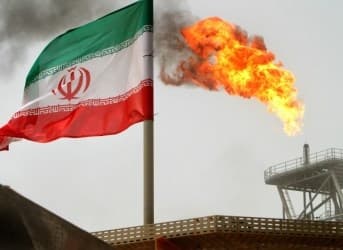Iran says it's received a little more than 10 percent of the oil money unlocked when it agreed to the terms of a nuclear agreement with the so-called P5-plus-1 last year. In November, the International Monetary Fund said Iran needed to start addressing fundamental structural challenges to its economy. Apart from an eventual recovery for its oil sector, Iran's nuclear posture may help address long-term economic woes. Or it may be a bitter case of irony for the Islamic republic.
Iran said it received about $550 million of the $4.2 billion in oil revenue frozen by sanctions in overseas bank accounts. Iran secured relief from sanctions when in November it agreed with the five permanent members of the U.N. Security Council -- United States, Russia, China, United Kingdom, and France -- plus Germany to curb its enrichment activity.
The IMF said in an October financial survey Iran's real gross domestic production should increase by 1.3 percent in 2014, erasing years of decline. In 2012, the Iranian currency, the rial, collapsed under sanctions pressure. The value of its currency has since rebounded in the wake of the November deal, though inflation is still high and any recovery in the rial is still short of what's needed to offset the economic hardship from sanctions. The IMF, meanwhile, cautioned economic growth in countries like Iran that rely on oil exports may be vulnerable to market dynamics.
Iranian President Hassan Rouhani in November blamed his predecessor, Mahmoud Ahmadinejad, for the poor state of the nation's economy. When he ran for office last year, Rouhani, a former nuclear negotiator, vowed to put Iran on course to play a more productive role on the international stage. When he spoke to delegates at the World Economic Forum in Davos, Switzerland, last month, he said Iran was ready to take its place among leading world economies.
"I view Iran's economy as the most congruent, capable and closest to that of successful emerging economies, and I see Iran's place alongside them in the future," he said.
The World Bank said Iran's economy ranked 22nd in the world as of 2012 and 80 percent of its economy relies on petroleum. Rouhani's chief of staff, Mohammad Nahavandian, this week welcomed more than 100 executives from a French trade delegation by saying Iran was at the dawn of a new chapter in economic ties to Europe. Last week, Mohammad Souri, an adviser to the Oil Ministry, said companies ranging from BP to Spain's Repsol "will return to Iran and oil activities with these companies will resume."
The IMF's assessment of Iran, drafted before the November nuclear agreement, said a steady decline in oil prices could leave major exporters with a fiscal deficit, however. Iran has stumped in the past to keep oil prices elevated, though fiscal uncertainty, lower consumer demand and the oil glut from North America has kept crude prices depressed.
OPEC said in its monthly market report the Iranian economy is already showing signs of a recovery along with oil production, which averaged 2.7 million bpd in December. More Iranian crude, however, could force OPEC members to make adjustments to their export quotas. That might not sit well with Saudi Arabia, OPEC's top producer and Iran's No. 1 regional adversary. If OPEC doesn't cede to a surging Iran, the cartel's overall output could increase. That, in turn, could lead to lower overall market prices for crude oil, leaving Iran in an economic Catch-22.
ADVERTISEMENT
By. Daniel J. Graeber of Oilprice.com


















